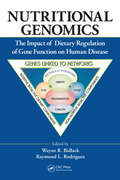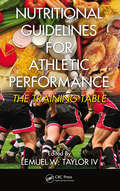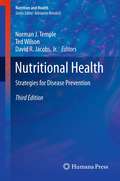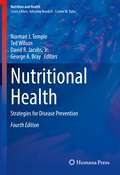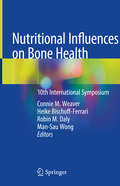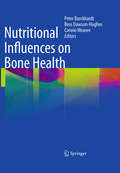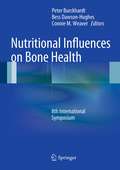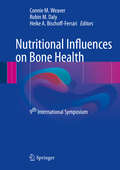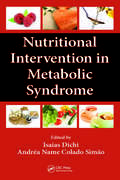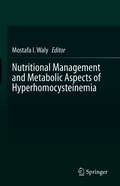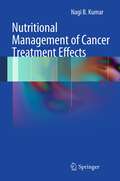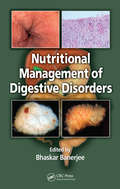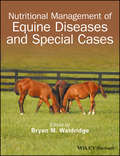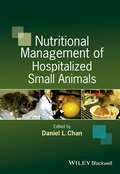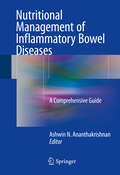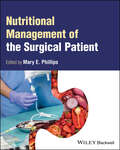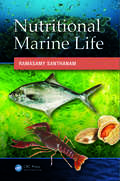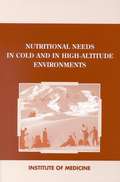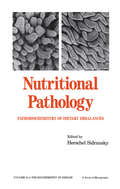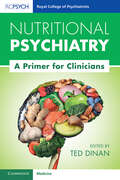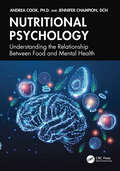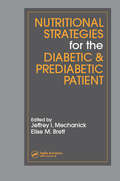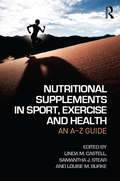- Table View
- List View
Nutritional Genomics: The Impact of Dietary Regulation of Gene Function on Human Disease
by Raymond L. Rodriguez Wayne R. BidlackThe notion of matching diet with an individual's genetic makeup is transforming the way the public views nutrition as a means of managing health and preventing disease. To fulfill the promise of nutritional genomics, researchers are beginning to reconcile the diverse properties of dietary factors with our current knowledge of genome structure and g
Nutritional Guidelines for Athletic Performance: The Training Table
by Lemuel W. Taylor IVBasic nutrition requirements and proper training are the two most important factors for athletes to achieve peak performance levels. This volume addresses these needs on a comprehensive basis from a training table perspective. Offering practical guidelines for practitioners and athletes, the book focuses on the key macronutrients that fuel daily metabolism and exercise training, and explores differing needs for various athletes and their individual goals. It discusses how to determine body weight for a desired body fat percentage, recommended calorie consumption, dietary suggestions, and useful meal planning tools for a wide variety of caloric needs.
Nutritional Health
by Norman J. Temple Ted Wilson David R. Jacobs Jr.Now going into its third much-expanded edition, the highly praised Nutritional Health: Strategies for Disease Prevention has been brought fully up to date to include all the new thinking and discoveries that have the greatest capacity to improve human health and nutritional advancement. About half the new edition will be revised and updated from the second edition while the other half will consist of major revisions of previous chapters or new subjects. Like the two previous editions the book will consist of general reviews on various topics in nutrition, especially those of much current interest. The authors provide extensive, in-depth chapters covering the most important aspects of the complex interactions between diet, its nutrient components, and their impacts on disease states, and on those health conditions that increase the risk of chronic dieases. Up to date and comprehensive, Nutritional Health: Strategies for Disease Prevention, Third Edition offers physicians, dietitians, and nutritionists a practical, data-driven, integrated resource to help evaluate the critical role of nutrition.
Nutritional Health: Strategies for Disease Prevention (Nutrition and Health)
by Norman J. Temple George A. Bray Ted Wilson David R. Jacobs Jr.This fourth edition brings together a diverse range of experts in nutrition-related areas to discuss recent thinking and discoveries in nutrition, especially in relation to topics that have the greatest capacity to improve human health and nutritional implementation. An overview of nutrition science in the third decade of the twenty-first century reveals that much water has flown under the bridge of the advancing river that is nutrition research and practice. With these large accumulations of developments in the field of nutrition, the need for a new edition of this book is obvious. Our vastly improved nutrition knowledge gives us the capability of preventing a sizable fraction of the chronic diseases that afflict the people of our world, but only if these discoveries can be translated into effective action at the population level. Nutritional Health endeavours to address the needs of those who would most benefit from up-to-date information on key areas in the field of nutrition.The book starts with a discussion of the nature of nutritional research then moves into an overview of the most important aspects of the complex interactions between diet, its nutrient components, and their impacts on disease states, and on those health conditions that increase the risk of chronic diseases. Parts three and four discuss diet and include new chapters on the Mediterranean diet, the DASH diet, the flexitarian diet, and the low-carbohydrate diet. The final two parts of the book discuss emerging trends in nutrition science, such as gut microbiome and sustainable diet, and areas of controversy in nutrition, such as the influence of the food industry and dietary supplements. Up to date and comprehensive, Nutritional Health: Strategies for Disease Prevention, Fourth Edition offers physicians, dietitians, and nutritionists a practical, data-driven, integrated resource to help evaluate the critical role of nutrition.
Nutritional Influences on Bone Health: 10th International Symposium
by Connie M. Weaver Robin M. Daly Heike Bischoff-Ferrari Man-Sau WongThis book comprehensively covers the topics and discussions covered at the 10th International Symposium on Nutritional Aspects of Osteoporosis. It is the only international meeting that exclusively covers the role of nutrition on musculoskeletal health and function. Current thinking on the role of nutrition on bone and muscle development and health, and as a means of preventing osteoporosis, falls and fractures is covered. The latest evidence on the potential roles that protein, potassium, B vitamins, vitamin D, omega-3 fatty acids, and flavonoids in the context of bone and muscle health are also discussed. Nutritional Influences on Bone Health reviews the role of nutrition in bone health and its potential role in preventing osteoporosis and sarcopenia in ageing populations, providing a valuable and practically applicable resource for practising and trainee health and medical professionals.
Nutritional Influences on Bone Health: 7th International Symposium
by Connie M. Weaver Peter Burckhardt Bess Dawson-HughesThe seventh symposium on “Nutritional Aspects of Osteoporosis” continues to be the primary forum for scientists to focus on the impact of nutrition on bone health in general. Since 1991, the year of the first symposium, research in this field has increased impressively and has become an established part of research and science in osteology. This symposium in particular featured many global comparisons in diet and the effect on bone. As Western diet permeates more of the globe and the population continues to grow, it is meaningful to study the impact of these changes on bone health as diet is one of the few major modifable factors which in turn affects health care costs. Calcium, vitamin D, and acid-base balance continued to dominate the discussion. The symposium offered an opportunity to learn about theories and data in nutritional research concerning bone as well as methodological approaches to classify diets. The proceedings allow the reader to capture the new messages, to analyze the new scientific data presented, and to use the book as a source of references in this feld.<P> This work comprises papers from the 7th International Symposium on Nutritional Aspects of Osteoporosis in 2009 in Lausanne, Switzerland.
Nutritional Influences on Bone Health: 8th International Symposium
by Connie M. Weaver Peter Burckhardt Bess Dawson-HughesNutritional Influences on Bone Health presents a collection of papers from the 8th International Symposium on Nutritional Aspects of Osteoporosis, the primary forum for and only regular meeting exclusively devoted to the topic of nutritional influences on bone health. The outcome is a fusion of the most current and up-to-date research in this area. Key themes include the permeation of the Western diet across the globe, calcium, vitamin D and acid-base balance. Written by authorities on the impact of nutrition on bone health, Nutritional Influences on Bone Health brings the reader the emerging trends, new messages and the latest scientific data in the field, to inform future research and clinical practice. This comprehensive, well researched volume is an essential reference for professionals in the field of bone health and nutrition.
Nutritional Influences on Bone Health: 9th International Symposium
by Connie M. Weaver Robin M. Daly Heike A. Bischoff-FerrariThe 9th International Symposium is the only regular meeting in the bone field to be exclusively devoted to nutrition, bone and muscle, and it allows the authors of this book to review the new scientific data, discuss new concepts, and update the knowledge on several nutrients. The Symposium provides a unique opportunity to connect health professionals, researchers and industry across many disciplines, including nutrition and dietetics, exercise science, gerontology, nursing, general practice, academia and the food and fitness industry. Most causes for osteoporosis, like genetics, age, menopause, and associated diseases with their treatments, are not modifiable. The investigation of the influence of nutrition on bone health is important as a key modifiable factor of the development of bone and the prevention of osteoporosis. It is the privilege of this symposium to gather every three years with scientists from all over the world working in this field.
Nutritional Intervention in Metabolic Syndrome
by Isaias Dichi Andréa Name Colado SimãoMetabolic syndrome (MS) is a combination of medical disorders that, when occurring together, increase the risk of developing cardiovascular disease and diabetes. The prevalence of MS is rising in developing countries and developed countries, now considered a pandemic disease. This book presents information on how to treat MS through lifestyle change and nutritional intervention. Chapters cover prevalence of MS; pathophysiology; MS in systemic lupus erythematosus and rheumatoid arthritis; gene-nutrient interactions; MS in adolescents and children; lifestyle change and physical activity; and various effects of dietary components in MS.
Nutritional Lithium: The Untold Tale of a Mineral That Transforms Lives and Heals the Brain
by James M. Greenblatt Kayla GrossmannOur fast-paced and frenetic lifestyle, coupled with a grossly polluted environment, has created the perfect breeding ground for mental instability. With the spread of brain disorders on the rise around the world, nutritional biochemistry and one of its stars, lithium, has stepped into the spotlight to offer proven methods to heal our bodies from the inside out. Nutritional Lithium: A Cinderella Story illustrates the significance of this precious mineral not only as a nutrient vital to human development.
Nutritional Management and Metabolic Aspects of Hyperhomocysteinemia
by Mostafa I. WalyElevated blood concentrations of homocysteine, B vitamins deficiencies and oxidative stress are etiological factors for many human chronic diseases, yet the etiologic relationship of hyperhomocysteinemia to these disorders remains poorly understood. Clinical trials continue to support the notion that hyperhomocysteinemia is involved in the pathogenesis of oxidative stress and its associated impairment of cellular redox status. Antioxidants, phytochemicals, and bioactive agents are thought to be associated with the reduction of oxidative stress and reducing risk of chronic diseases, yet their role in preventing hyperhomocysteinemia-mediated oxidative stress has not been well covered in the literature. Nutritional Management and Metabolic Aspects and of Hyperhomocysteinemia comprehensively covers the nutritional-based intervention for combating hyperhomocysteinemia-mediated oxidative stress, metabolic regulation of homocysteine-dependent transulfuration and transmethylation pathways, and the identification of novel biomarkers for early diagnosis of hyperhomocysteinemia. The main goal of this text is to address the biochemical and nutritional aspects of hyperhomocysteinemia in relation to increasing risk of chronic diseases, providing insight into the etiology of hyperhomocysteinemia and covering new research on the effective reduction and management of hyperhomocysteinemia-associated chronic diseases. For researchers seeking a singular source for the understanding of the biochemical aspects and nutrition-based combat of hyperhomocysteinemia, its risk factors, preventive measures, and possible treatments currently available, this text provides all of the important needed information in up-to-date and comprehensive form.
Nutritional Management of Cancer Treatment Effects
by Nagi B. KumarMalnutrition and its related symptoms are both frequent and deleterious effects of cancer treatment. Despite the importance of targeted nutritional interventions in ameliorating these effects, however, publications providing up-to-date information on novel nutritional approaches and strategies are lacking. This book is intended to fill the void by describing and evaluating in detail the nutritional strategies that may be employed to alleviate a wide variety of cancer treatment effects. The guidance provided will help to improve the survival and quality of life of cancer patients, and has the potential to dramatically affect how evidence-based clinical practice is established and improved over the coming decade. The author is a distinguished expert in the field who has more than 25 years of experience in oncology nutrition and has been involved in establishing and implementing a Clinical Nutrition Oncology Program.
Nutritional Management of Digestive Disorders
by Bhaskar BanerjeeThanks to new tools of research and the heightened scientific rigor with which they are applied, medical science has reached a far more heightened understanding of nutrition's complex relation with digestive disease. Nutritional education as well as support is critical in the successful management and treatment of individuals with gastrointestinal disorders. This compact, practical guide provides suggestions on the management of digestive disorders with an emphasis on nutrition. Chapters are written by both nutritionists and gastroenterologists who offer practical advice and clinical insight with regard to dietary and nutritional therapeutics. Organized according to digestive anatomy, the book starts with the upper tract (esophagus), moves down the gastrointestinal tract, and covers information on ancillary organs involved in digestive disorders. An extensive appendix includes information on calories, diets, drugs, formulas, and vitamins in easy-to-read format.
Nutritional Management of Equine Diseases and Special Cases
by Bryan M. WaldridgeNutritional Management of Equine Diseases and Special Cases offers a concise, easy-to-comprehend text for equine veterinarians with questions about commonly encountered nutritional problems. Assists veterinarians in supporting equine patients with special nutritional needs Focuses on nutritional problems and impact on different body systems Covers ponies, miniature horses, draft horses, donkeys, and mules Offers complete coverage of common diseases and problems helped by nutrition Includes useful chapters on poisonous plants and mycotoxins
Nutritional Management of Hospitalized Small Animals
by Daniel ChanNutritional Management of Hospitalized Small Animals offers veterinarians, veterinary students and technicians a comprehensive reference to the latest information relating to the principles and practice of nutritional support in small animals that require hospitalization. Represents the definitive resource for small animal veterinarians in providing optimal nutritional support for their patients during hospitalization Discusses and demonstrates the most up-to-date techniques available for successfully implementing nutritional support for hospitalized small animal patients Provides step-by-step pictorial instructions on how to implement the most appropriate techniques for particular patients Reveals expected outcomes and possible complications along with strategies to minimize risk of complications
Nutritional Management of Inflammatory Bowel Diseases
by Ashwin N. AnanthakrishnanThis book is a state-of-the art review for clinicians and dieticians with an interest in nutrition and inflammatory bowel diseases (Crohn's disease, ulcerative colitis). The volume covers new data about dietary risk factors for Crohn's disease and ulcerative colitis, examines the association between diet and microbiome, describes the various diets in the management of these diseases, and discusses macro- and micronutrient deficiency that occurs in such patients. The book also examines the management of patients on total parenteral nutrition, and management of the short gut syndrome with TPN and novel pharmacologic therapies. Written by experts in their fields, Nutritional Management of Inflammatory Bowel Diseases: A Comprehensive Guide is a valuable and uniquely specialized resource for gastroenterologists, nutritionists, primary care physicians, and other health care providers and researchers dealing with the management of these complex illnesses.
Nutritional Management of the Surgical Patient
by Mary E. PhillipsNutritional Management of the Surgical Patient Manage patient diet and nutrition with this comprehensive guide Nutritional Management of the Surgical Patient provides the first comprehensive evidence-based overview of the nutritional and dietary therapies for surgical patients. It takes clinicians through every stage of surgery, from pre-operative and immediate post-operative care, through to long term recovery and survivorship. This book describes the impact of surgical procedures and their complications and the effect these have on nutritional status as well as the nutritional strategies utilised to manage patients in these settings. The result is a valuable survey of this essential aspect of surgery. Nutritional Management of the Surgical Patient features case studies which capture both typical patients and the more unusual cases to help clinicians understand the impact of nutrition in both circumstances. The textbook also details a range of surgical procedures to support underpinning knowledge of the mechanism behind nutritional intervention. Readers will also find: Consideration in each chapter of both short- and long-term nutritional management Discussion of potential long-term complications such as small intestinal bacterial overgrowth, bile acid diarrhoea, micronutrient deficiencies and osteoporosis Questions to support consolidation of knowledge and promote understanding in clinical context Nutritional Management of the Surgical Patient is a must-have for surgeons, surgical dietitians, trainees and all healthcare professionals involved in the care of surgical patients.
Nutritional Marine Life
by Ramasamy SanthanamThe nutritional benefits of marine flora and fauna are well known. Fish and crustaceans provide high-quality sources of amino acids-nutritionallyimportant proteins found in only small amounts in cereals and grains. Nutrients and minerals in seafood can improve brain development and reproduction and there are strong links between fish and heart heal
Nutritional Needs In Cold And In High-Altitude Environments: Applications for Military Personnel in Field Operations
by Committee on Military Nutrition ResearchThis book reviews the research pertaining to nutrient requirements for working in cold or in high-altitude environments and states recommendations regarding the application of this information to military operational rations. It addresses whether, aside from increased energy demands, cold or high-altitude environments elicit an increased demand or requirement for specific nutrients, and whether performance in cold or high-altitude environments can be enhanced by the provision of increased amounts of specific nutrients.
Nutritional Pathology: Pathobiochemistry of Dietary Imbalances
by H. SidranskyThis book examines several recent, major developments in the field of nutritional pathology, providing enhanced, current understanding of the role that altered or disturbed nutrition plays in the pathogenesis of disease. It is intended for students in pathology, nutrition, and biochemistry.
Nutritional Psychiatry: A Primer for Clinicians
by Ted DinanThere is increasing evidence that mental health problems such as schizophrenia, depression and anxiety are linked with poor nutrition. At present, very few psychiatrists provide nutritional advice for their patients, despite such advice complimenting drug and psychological therapies. This edited volume is the first book to provide a comprehensive overview of the relationship between nutrition and mental health, for mental health professionals. Featuring contributions from leading authorities in the field, the book examines the link between diet and the microbiome-gut brain axis and how this correlates with a variety of psychiatric disorders. The book explores how enhancing the beneficial bacteria in the gut, through the use of psychobiotics, prebiotics or dietary change can improve mood and reduce anxiety. The book will appeal to psychiatrists and psychologists, behavioural scientists, neuroscientists and nutritionists.
Nutritional Psychology: Understanding the Relationship Between Food and Mental Health
by Andrea Cook Jennifer ChampionNutritional Psychology: Understanding the Relationship Between Food and Mental Health provides a broad look at the intersection between food and mental health and offers a comprehensive approach to effectively prioritize nutrition as a powerful component to maintaining overall wellbeing. Each of the 16 chapters deeply informs about a broad range of nutritional factors including those that promote stable blood sugar levels, optimize brain functioning, and contribute to the microbiome and hormone levels so important to the brain-gut connection. There are useful insights into the dynamics of food selection, eating disorders, obesity, body image, and nutrition quality that can stabilize or destabilize mental and emotional disorders. Additionally, environmental influences that shape eating behaviors are fully explored.Nutritional Psychology: Understanding the Relationship Between Food and Mental Health combines psychology, nutrition, and medicine to form a framework for optimizing the relationship between diet and mental wellbeing. This textbook is designed for undergraduate and graduate psychology and nutrition college courses for students pursuing careers as psychologists, dietitians, nurses, social workers, and a variety of health professionals who want to incorporate nutrition and eating behavior into their discussions with patients.Dr. Cook and Dr. Champion are both clinicians who work directly with clients with psychological and physical health issues and utilize a blend of nutritional and psychological interventions in their work, providing useful clinical applications for nutritional psychology.
Nutritional Strategies for the Diabetic/Prediabetic Patient (Nutrition And Disease Prevention Ser.)
by Jeffrey I. Mechanick Elise M. BrettWhile nutrition is central to the management of diabetes, there is no onediabetic diet. Nutritional prescriptions depend on the type of diabetes, food preferences, lifestyle, treatment regimen, comorbidities, state of health, and the route of caloric administration. Nutritional Strategies for the Diabetic/Prediabetic Patient is a comprehensive r
Nutritional Strategies for the Very Low Birthweight Infant
by David H. AdamkinThe goal of nutritional management in VLBW and ELBW infants is the achievement of postnatal growth at a rate that approximates the intrauterine growth of a normal fetus at the same postconceptional age. In reality, however, growth lags considerably after birth; although non-nutritional factors are involved, nutrient deficiencies are critical in explaining delayed growth. This practical clinically-oriented pocketbook reviews and summarises all available clinical evidence. It enables the reader to implement parenteral or enteral feeding plans, with the goals of reducing postnatal weight loss, earlier return to birthweight, and improved catch-up growth. Both nutrient balance and growth and the impact on neurodevelopment and health outcomes are evaluated. With many tables and algorithms to summarise key data and management strategies, Nutritional Strategies for the Very Low Birthweight Infant is an invaluable guide for all healthcare professionals caring for premature babies.
Nutritional Supplements in Sport, Exercise and Health: An A-Z Guide
by Linda M. Castell Samantha J. Stear Louise M. BurkeNutritional Supplements in Sport, Exercise and Health is the most up-to-date and authoritative guide to dietary supplements, ergogenic aids and sports nutrition foods currently available. Consisting of over 140 evidence-based review articles written by world-leading research scientists and practitioners, the book aims to dispel the misinformation that surrounds supplements and supplementation, offering a useful, balanced and unbiased resource. The reviews are set out in an A-Z format and include: definitions alongside related products; applicable food sources; where appropriate, practical recommendations such as dosage and timing, possible nutrient interactions requiring the avoidance of other nutrients, and any known potential side effects; and full research citations. The volume as a whole addresses the key issues of efficacy, safety, legality and ethics, and includes additional reviews on the WADA code, inadvertent doping, and stacking. Combining the most up-to-date scientific evidence with consideration of practical issues, this book is an essential reference for any healthcare professional working in sport and exercise, any student or researcher working in sport and exercise science, sports medicine, health science or nutrition, and for all coaches and support teams working with athletes.
